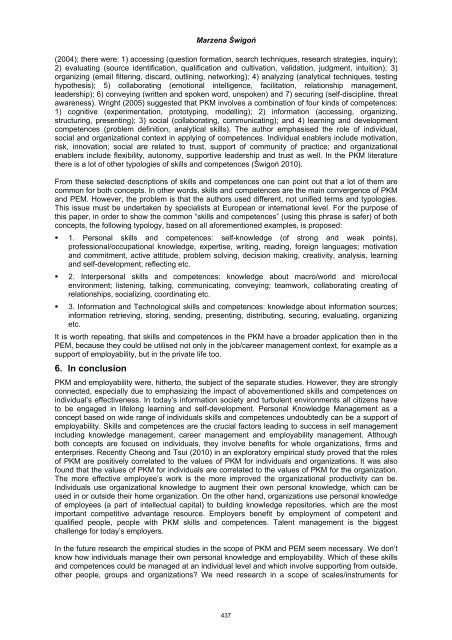Proceedings of the 3rd European Conference on Intellectual Capital
Proceedings of the 3rd European Conference on Intellectual Capital
Proceedings of the 3rd European Conference on Intellectual Capital
You also want an ePaper? Increase the reach of your titles
YUMPU automatically turns print PDFs into web optimized ePapers that Google loves.
Marzena Świgoń<br />
(2004); <str<strong>on</strong>g>the</str<strong>on</strong>g>re were: 1) accessing (questi<strong>on</strong> formati<strong>on</strong>, search techniques, research strategies, inquiry);<br />
2) evaluating (source identificati<strong>on</strong>, qualificati<strong>on</strong> and cultivati<strong>on</strong>, validati<strong>on</strong>, judgment, intuiti<strong>on</strong>); 3)<br />
organizing (email filtering, discard, outlining, networking); 4) analyzing (analytical techniques, testing<br />
hypo<str<strong>on</strong>g>the</str<strong>on</strong>g>sis); 5) collaborating (emoti<strong>on</strong>al intelligence, facilitati<strong>on</strong>, relati<strong>on</strong>ship management,<br />
leadership); 6) c<strong>on</strong>veying (written and spoken word, unspoken) and 7) securing (self-discipline, threat<br />
awareness). Wright (2005) suggested that PKM involves a combinati<strong>on</strong> <str<strong>on</strong>g>of</str<strong>on</strong>g> four kinds <str<strong>on</strong>g>of</str<strong>on</strong>g> competences:<br />
1) cognitive (experimentati<strong>on</strong>, prototyping, modelling); 2) informati<strong>on</strong> (accessing, organizing,<br />
structuring, presenting); 3) social (collaborating, communicating); and 4) learning and development<br />
competences (problem definiti<strong>on</strong>, analytical skills). The author emphasised <str<strong>on</strong>g>the</str<strong>on</strong>g> role <str<strong>on</strong>g>of</str<strong>on</strong>g> individual,<br />
social and organizati<strong>on</strong>al c<strong>on</strong>text in applying <str<strong>on</strong>g>of</str<strong>on</strong>g> competences. Individual enablers include motivati<strong>on</strong>,<br />
risk, innovati<strong>on</strong>; social are related to trust, support <str<strong>on</strong>g>of</str<strong>on</strong>g> community <str<strong>on</strong>g>of</str<strong>on</strong>g> practice; and organizati<strong>on</strong>al<br />
enablers include flexibility, aut<strong>on</strong>omy, supportive leadership and trust as well. In <str<strong>on</strong>g>the</str<strong>on</strong>g> PKM literature<br />
<str<strong>on</strong>g>the</str<strong>on</strong>g>re is a lot <str<strong>on</strong>g>of</str<strong>on</strong>g> o<str<strong>on</strong>g>the</str<strong>on</strong>g>r typologies <str<strong>on</strong>g>of</str<strong>on</strong>g> skills and competences (Świgoń 2010).<br />
From <str<strong>on</strong>g>the</str<strong>on</strong>g>se selected descripti<strong>on</strong>s <str<strong>on</strong>g>of</str<strong>on</strong>g> skills and competences <strong>on</strong>e can point out that a lot <str<strong>on</strong>g>of</str<strong>on</strong>g> <str<strong>on</strong>g>the</str<strong>on</strong>g>m are<br />
comm<strong>on</strong> for both c<strong>on</strong>cepts. In o<str<strong>on</strong>g>the</str<strong>on</strong>g>r words, skills and competences are <str<strong>on</strong>g>the</str<strong>on</strong>g> main c<strong>on</strong>vergence <str<strong>on</strong>g>of</str<strong>on</strong>g> PKM<br />
and PEM. However, <str<strong>on</strong>g>the</str<strong>on</strong>g> problem is that <str<strong>on</strong>g>the</str<strong>on</strong>g> authors used different, not unified terms and typologies.<br />
This issue must be undertaken by specialists at <str<strong>on</strong>g>European</str<strong>on</strong>g> or internati<strong>on</strong>al level. For <str<strong>on</strong>g>the</str<strong>on</strong>g> purpose <str<strong>on</strong>g>of</str<strong>on</strong>g><br />
this paper, in order to show <str<strong>on</strong>g>the</str<strong>on</strong>g> comm<strong>on</strong> “skills and competences” (using this phrase is safer) <str<strong>on</strong>g>of</str<strong>on</strong>g> both<br />
c<strong>on</strong>cepts, <str<strong>on</strong>g>the</str<strong>on</strong>g> following typology, based <strong>on</strong> all aforementi<strong>on</strong>ed examples, is proposed:<br />
1. Pers<strong>on</strong>al skills and competences: self-knowledge (<str<strong>on</strong>g>of</str<strong>on</strong>g> str<strong>on</strong>g and weak points),<br />
<br />
pr<str<strong>on</strong>g>of</str<strong>on</strong>g>essi<strong>on</strong>al/occupati<strong>on</strong>al knowledge, expertise, writing, reading, foreign languages; motivati<strong>on</strong><br />
and commitment, active attitude, problem solving, decisi<strong>on</strong> making, creativity, analysis, learning<br />
and self-development, reflecting etc.<br />
2. Interpers<strong>on</strong>al skills and competences: knowledge about macro/world and micro/local<br />
envir<strong>on</strong>ment; listening, talking, communicating, c<strong>on</strong>veying; teamwork, collaborating creating <str<strong>on</strong>g>of</str<strong>on</strong>g><br />
relati<strong>on</strong>ships, socializing, coordinating etc.<br />
3. Informati<strong>on</strong> and Technological skills and competences: knowledge about informati<strong>on</strong> sources;<br />
informati<strong>on</strong> retrieving, storing, sending, presenting, distributing, securing, evaluating, organizing<br />
etc.<br />
It is worth repeating, that skills and competences in <str<strong>on</strong>g>the</str<strong>on</strong>g> PKM have a broader applicati<strong>on</strong> <str<strong>on</strong>g>the</str<strong>on</strong>g>n in <str<strong>on</strong>g>the</str<strong>on</strong>g><br />
PEM, because <str<strong>on</strong>g>the</str<strong>on</strong>g>y could be utilised not <strong>on</strong>ly in <str<strong>on</strong>g>the</str<strong>on</strong>g> job/career management c<strong>on</strong>text, for example as a<br />
support <str<strong>on</strong>g>of</str<strong>on</strong>g> employability, but in <str<strong>on</strong>g>the</str<strong>on</strong>g> private life too.<br />
6. In c<strong>on</strong>clusi<strong>on</strong><br />
PKM and employability were, hi<str<strong>on</strong>g>the</str<strong>on</strong>g>rto, <str<strong>on</strong>g>the</str<strong>on</strong>g> subject <str<strong>on</strong>g>of</str<strong>on</strong>g> <str<strong>on</strong>g>the</str<strong>on</strong>g> separate studies. However, <str<strong>on</strong>g>the</str<strong>on</strong>g>y are str<strong>on</strong>gly<br />
c<strong>on</strong>nected, especially due to emphasizing <str<strong>on</strong>g>the</str<strong>on</strong>g> impact <str<strong>on</strong>g>of</str<strong>on</strong>g> abovementi<strong>on</strong>ed skills and competences <strong>on</strong><br />
individual’s effectiveness. In today’s informati<strong>on</strong> society and turbulent envir<strong>on</strong>ments all citizens have<br />
to be engaged in lifel<strong>on</strong>g learning and self-development. Pers<strong>on</strong>al Knowledge Management as a<br />
c<strong>on</strong>cept based <strong>on</strong> wide range <str<strong>on</strong>g>of</str<strong>on</strong>g> individuals skills and competences undoubtedly can be a support <str<strong>on</strong>g>of</str<strong>on</strong>g><br />
employability. Skills and competences are <str<strong>on</strong>g>the</str<strong>on</strong>g> crucial factors leading to success in self management<br />
including knowledge management, career management and employability management. Although<br />
both c<strong>on</strong>cepts are focused <strong>on</strong> individuals, <str<strong>on</strong>g>the</str<strong>on</strong>g>y involve benefits for whole organizati<strong>on</strong>s, firms and<br />
enterprises. Recently Che<strong>on</strong>g and Tsui (2010) in an exploratory empirical study proved that <str<strong>on</strong>g>the</str<strong>on</strong>g> roles<br />
<str<strong>on</strong>g>of</str<strong>on</strong>g> PKM are positively correlated to <str<strong>on</strong>g>the</str<strong>on</strong>g> values <str<strong>on</strong>g>of</str<strong>on</strong>g> PKM for individuals and organizati<strong>on</strong>s. It was also<br />
found that <str<strong>on</strong>g>the</str<strong>on</strong>g> values <str<strong>on</strong>g>of</str<strong>on</strong>g> PKM for individuals are correlated to <str<strong>on</strong>g>the</str<strong>on</strong>g> values <str<strong>on</strong>g>of</str<strong>on</strong>g> PKM for <str<strong>on</strong>g>the</str<strong>on</strong>g> organizati<strong>on</strong>.<br />
The more effective employee’s work is <str<strong>on</strong>g>the</str<strong>on</strong>g> more improved <str<strong>on</strong>g>the</str<strong>on</strong>g> organizati<strong>on</strong>al productivity can be.<br />
Individuals use organizati<strong>on</strong>al knowledge to augment <str<strong>on</strong>g>the</str<strong>on</strong>g>ir own pers<strong>on</strong>al knowledge, which can be<br />
used in or outside <str<strong>on</strong>g>the</str<strong>on</strong>g>ir home organizati<strong>on</strong>. On <str<strong>on</strong>g>the</str<strong>on</strong>g> o<str<strong>on</strong>g>the</str<strong>on</strong>g>r hand, organizati<strong>on</strong>s use pers<strong>on</strong>al knowledge<br />
<str<strong>on</strong>g>of</str<strong>on</strong>g> employees (a part <str<strong>on</strong>g>of</str<strong>on</strong>g> intellectual capital) to building knowledge repositories, which are <str<strong>on</strong>g>the</str<strong>on</strong>g> most<br />
important competitive advantage resource. Employers benefit by employment <str<strong>on</strong>g>of</str<strong>on</strong>g> competent and<br />
qualified people, people with PKM skills and competences. Talent management is <str<strong>on</strong>g>the</str<strong>on</strong>g> biggest<br />
challenge for today’s employers.<br />
In <str<strong>on</strong>g>the</str<strong>on</strong>g> future research <str<strong>on</strong>g>the</str<strong>on</strong>g> empirical studies in <str<strong>on</strong>g>the</str<strong>on</strong>g> scope <str<strong>on</strong>g>of</str<strong>on</strong>g> PKM and PEM seem necessary. We d<strong>on</strong>’t<br />
know how individuals manage <str<strong>on</strong>g>the</str<strong>on</strong>g>ir own pers<strong>on</strong>al knowledge and employability. Which <str<strong>on</strong>g>of</str<strong>on</strong>g> <str<strong>on</strong>g>the</str<strong>on</strong>g>se skills<br />
and competences could be managed at an individual level and which involve supporting from outside,<br />
o<str<strong>on</strong>g>the</str<strong>on</strong>g>r people, groups and organizati<strong>on</strong>s? We need research in a scope <str<strong>on</strong>g>of</str<strong>on</strong>g> scales/instruments for<br />
437
















